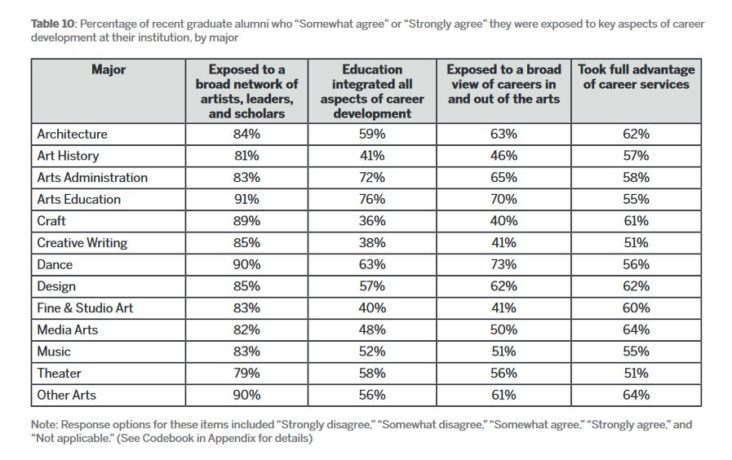The Strategic National Arts Alumni Project (SNAAP) just released a special report that focused on how alumni of creative arts programs across different graduate cohorts felt about the education they received. Since I am interested in the conversation about artist as entrepreneur and career preparation, I gravitated toward those findings.
All cohorts from pre-1985 through 2015 felt they could have used more education in career preparation.
In the module, alumni are asked whether they would have benefited from more knowledge on:
a. developing a three- to five-year strategic plan to realize their goals;
b. marketing and promoting their work and talents;
c. communicating through and about their art through engaging with the community, speaking in public, and receiving feedback;
d. managing finances through things like developing budgets, raising money for projects, and saving for the future;
e. and monitoring legal and tax issues like copyright, trademarks, sales, and income tax.Most alumni agreed they could have benefited from more knowledge in all of these areas (Table 3), with at least 80% of all alumni cohorts saying they would have benefited from more knowledge in each area.
Furthermore, alumni in each cohort reported about the same level of agreement (“Somewhat” or “Strongly”) when asked whether their education prepared them for work in many different jobs and roles. These reports ranged from a low of 65% in the 2006–2010 cohort to a high of 69% for the earliest two cohorts, leaving about one third of alumni in each cohort feeling their education did not prepare them for work in many different jobs and roles.
What really brought the perceived lack of preparation by alumni into focus was this next chart which reflects the degree to which career preparation was integrated into their education. Exposure to a network of professionals is relatively high. However, other aspects of career development and discussion of careers outside the arts are depressingly low for some disciplines.
The SNAAP report observes:
Institutions may need to further explore ways to provide career services across different major fields in the arts. Solitary fields, where art is less likely to be created or performed in groups, may not be getting the same quality of exposure.
Long time readers may recall that when I attended the Society for Arts Entrepreneurship Education conference last October, there was discussion about how university career services weren’t really well calibrated for arts careers.
One more chart I wanted to point out. After the reading the other content in this post, it probably won’t surprise you to see only 18% of respondents Strongly Agreed they were confident about financially managing their career. Also not surprising, confidence went down the more debt a person was carrying.
However, I was really encouraged by the resilience, adaptability and opportunity recognition numbers. Even if people don’t necessarily feel like got enough education in career planning, feeling capable in these three ability areas ain’t nothing to sneeze at. I am really curious about how those numbers compare to graduates from other degree disciplines.




There is another way. The Gewandhaus Leipzig in Germany (concert venue) offers flex- tickets for a small premium. Not an…